初中英语人教版八年级上册一般过去时态
- 格式:ppt
- 大小:220.50 KB
- 文档页数:32
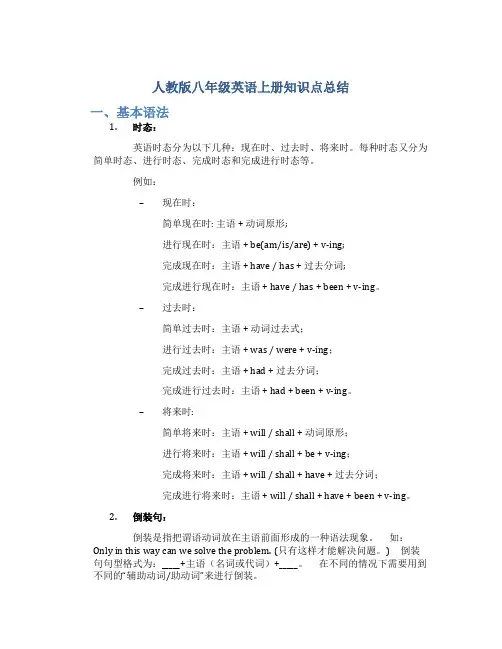
人教版八年级英语上册知识点总结一、基本语法1.时态:英语时态分为以下几种:现在时、过去时、将来时。
每种时态又分为简单时态、进行时态、完成时态和完成进行时态等。
例如:–现在时:简单现在时: 主语 + 动词原形;进行现在时:主语 + be(am/is/are) + v-ing;完成现在时:主语 + have / has + 过去分词;完成进行现在时:主语 + have / has + been + v-ing。
–过去时:简单过去时:主语 + 动词过去式;进行过去时:主语 + was / were + v-ing;完成过去时:主语 + had + 过去分词;完成进行过去时:主语 + had + been + v-ing。
–将来时:简单将来时:主语 + will / shall + 动词原形;进行将来时:主语 + will / shall + be + v-ing;完成将来时:主语 + will / shall + have + 过去分词;完成进行将来时:主语 + will / shall + have + been + v-ing。
2.倒装句:倒装是指把谓语动词放在主语前面形成的一种语法现象。
如:Only in this way can we solve the problem. (只有这样才能解决问题。
) 倒装句句型格式为:_____+主语(名词或代词)+_____。
在不同的情况下需要用到不同的“辅助动词/助动词”来进行倒装。
3.被动语态:被动语态就是在句子中表达动作的承受者(即主语)的语态。
结构为:被(或受)动责任的动词(to be) + 过去分词。
如:The book was written by him.(这本书是由他写的。
)4.虚拟语气:虚拟语气是指在表示假设,愿望,建议等语气时所使用的一种语态形式。
其结构为:主语+should/could/might/would+(have)+动词原形。
如: If I were you, I would buy this dress(如果我是你,我会买这件衣服。
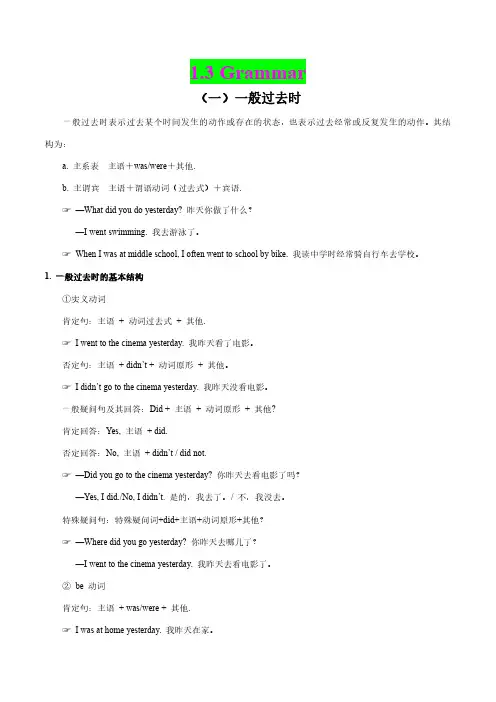
1.3Grammar(一)一般过去时一般过去时表示过去某个时间发生的动作或存在的状态,也表示过去经常或反复发生的动作。
其结构为:a.主系表主语+was/were+其他.b.主谓宾主语+谓语动词(过去式)+宾语.☞—What did you do yesterday?昨天你做了什么?—I went swimming.我去游泳了。
☞When I was at middle school,I often went to school by bike.我读中学时经常骑自行车去学校。
1.一般过去时的基本结构①实义动词肯定句:主语+动词过去式+其他.☞I went to the cinema yesterday.我昨天看了电影。
否定句:主语+didn’t+动词原形+其他。
☞I didn’t go to the cinema yesterday.我昨天没看电影。
一般疑问句及其回答:Did+主语+动词原形+其他?肯定回答:Yes,主语+did.否定回答:No,主语+didn’t/did not.☞—Did you go to the cinema yesterday?你昨天去看电影了吗?—Yes,I did./No,I didn’t.是的,我去了。
/不,我没去。
特殊疑问句:特殊疑问词+did+主语+动词原形+其他?☞—Where did you go yesterday?你昨天去哪儿了?—I went to the cinema yesterday.我昨天去看电影了。
②be动词肯定句:主语+was/were+其他.☞I was at home yesterday.我昨天在家。
否定句:主语+wasn’t/weren’t+其他.☞I wasn’t at home yesterday.我昨天没在家。
一般疑问句及其回答:Were/Was+主语+其他?☞—Were you at home yesterday?你昨天在家吗?—Yes,I was./No,I wasn’t.是的,我在家。
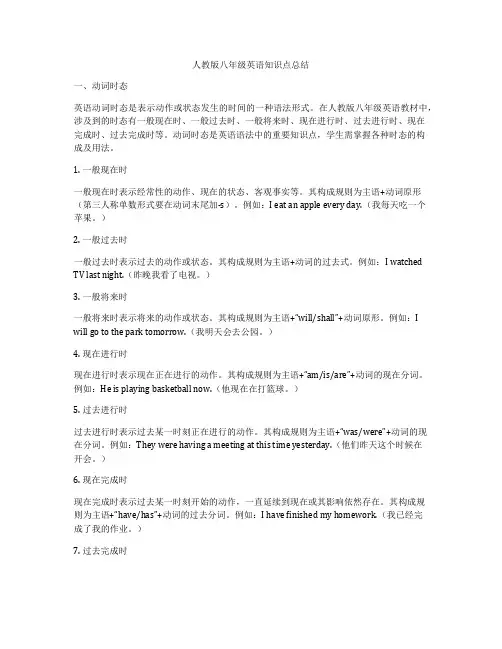
人教版八年级英语知识点总结一、动词时态英语动词时态是表示动作或状态发生的时间的一种语法形式。
在人教版八年级英语教材中,涉及到的时态有一般现在时、一般过去时、一般将来时、现在进行时、过去进行时、现在完成时、过去完成时等。
动词时态是英语语法中的重要知识点,学生需掌握各种时态的构成及用法。
1. 一般现在时一般现在时表示经常性的动作、现在的状态、客观事实等。
其构成规则为主语+动词原形(第三人称单数形式要在动词末尾加-s)。
例如:I eat an apple every day.(我每天吃一个苹果。
)2. 一般过去时一般过去时表示过去的动作或状态。
其构成规则为主语+动词的过去式。
例如:I watched TV last night.(昨晚我看了电视。
)3. 一般将来时一般将来时表示将来的动作或状态。
其构成规则为主语+“will/shall”+动词原形。
例如:I will go to the park tomorrow.(我明天会去公园。
)4. 现在进行时现在进行时表示现在正在进行的动作。
其构成规则为主语+“am/is/are”+动词的现在分词。
例如:He is playing basketball now.(他现在在打篮球。
)5. 过去进行时过去进行时表示过去某一时刻正在进行的动作。
其构成规则为主语+“was/were”+动词的现在分词。
例如:They were having a meeting at this time yesterday.(他们昨天这个时候在开会。
)6. 现在完成时现在完成时表示过去某一时刻开始的动作,一直延续到现在或其影响依然存在。
其构成规则为主语+“have/has”+动词的过去分词。
例如:I have finished my homework.(我已经完成了我的作业。
)7. 过去完成时过去完成时表示过去某一时刻之前已经发生的动作。
其构成规则为主语+“had”+动词的过去分词。
例如:She had gone to the park before I arrived.(我到达之前她已经去公园了。
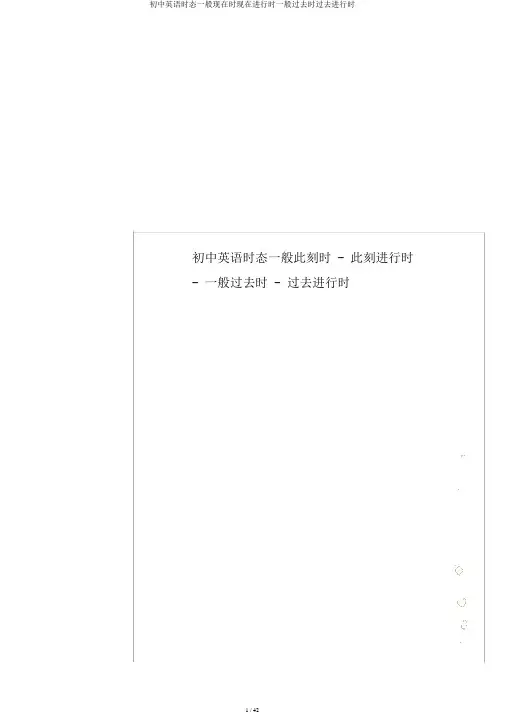
初中英语时态一般此刻时 - 此刻进行时- 一般过去时 - 过去进行时一般此刻时1.一般此刻时的基本用法:1)常常性或习惯性的动作,常与表示频次副词的时间状语连用。
时间状语: every morning(afternoon, Sunday), sometimes, on Sunday, often, usually 等.比如: I wake up at six O’clock every morning.My friends often go to the park on Sundays.2)用于表示客观真谛,客观存在,科学事实。
比如: The earth moves around the sun.Tomorrow is Tuesday.3)用于格言或警语中。
比如: Where there is a will, there is a way.4)用于表示此刻时辰的状态、能力、性格、个性。
比如: I don't want so much.She is a good girl and always help others.My watch is very new 。
2.一般此刻时的组成:当主语是第一人称,第二人称或第三人称复数时,谓语动词要用动词原形。
当主语是第三人称单数时,谓语动词要用第三人称单数形式,即动词词尾要加 s 或 es.例. We have four classes in the morning every day.They work in a big office.She likes singing very much.附注:动词的第三人称单数变化形式分为规则变化和不规则变化两种形式。
1.规则变化:(1)直接在动词词尾加 -s.ask---asks work---works get---gets stay---stays(2)以字母s, x, ch, sh 或o 结尾的动词,在词尾直接加 -es.fix---fixes do---does go---goes pass---passeswatch---watches wash____washes(3)以“辅音字母加“y”结尾的动词,要先变 y 为 i 再加 -es.try---tries study---studies cry---cr ies2.不规则变化:be---- is have----has3.一般此刻时的句子变换:变否认句、一般疑问句(1)一般疑问句:当句子中有 be 动词或神态动词时,则把 be 动词或神态动词提到主语的前方变为疑问句 ;否认句:在 be 动词或神态动词后边加 not变为否认句 .例: She is a student.I can swim.→ Is she a student?→Can you swim?→ She is not a student.→I can not swim.(2)一般疑问句:当句子中即没有 be 动词,也没有神态动词时,则在主语前加助动词 do, does变为问句;否认句:在主语后谓语动词前加助动词don’t, doesn变为’t否认句,助动词后的谓语动词要变为动词原形。
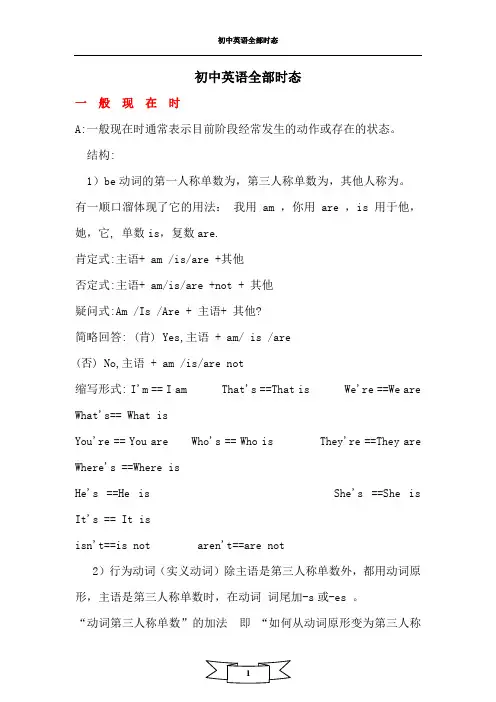
初中英语全部时态一般现在时A:一般现在时通常表示目前阶段经常发生的动作或存在的状态。
结构:1)be动词的第一人称单数为,第三人称单数为,其他人称为。
有一顺口溜体现了它的用法:我用am ,你用 are ,is 用于他,她,它, 单数is,复数are.肯定式:主语+ am /is/are +其他否定式:主语+ am/is/are +not + 其他疑问式:Am /Is /Are + 主语+ 其他?简略回答: (肯) Yes,主语 + am/ is /are(否) No,主语 + am /is/are not缩写形式: I'm == I am That's ==That is We're ==We are What's== What isYou're == You are Who's == Who is They're ==They areWhere's ==Where isHe's ==He is She's ==She is It's == It isisn't==is not aren't==are not2)行为动词(实义动词)除主语是第三人称单数外,都用动词原形,主语是第三人称单数时,在动词词尾加-s或-es 。
“动词第三人称单数”的加法即“如何从动词原形变为第三人称单数”1、一般情况加s.2、以o, s, x, ch, sh 结尾加es.3、以“辅音字母+y”结尾改y为i +es写出下列动词的第三人称单数:study play go come help teach lie listen begin open sit throw washguess cut run relax beat eat肯定式:主语+动词原形/动词的第三人称单数否定式:主语+助动词 don't/doesn't +动词原形+其他疑问式:Do/Does+主语+动词原形+其他简略回答:(肯)Yes,主语+do/does (否)No,主语+do/does not缩写形式: don't == do not doesn't ==does not注意:have的第三人称单数为has用法:1.表示事实,现状,性质或经常的,习惯的动作,常与often, usually,always, sometimes, today,every day,once a week, every fiveminutes, on Sundays等时间状语连用,eg. He has a brother.2.表示普遍真理. eg. The earth goes round the sun.3.表示在现在时间里所发生的一个动作 .eg. Here comes the train.4.在时间和条件状语从句中代表一般将来时 .eg.I'll go with you if you are free tomorrow.一般过去时一般过去时表示过去发生的动作或存在的状态,一般过去时通常由动词的过去式表示。
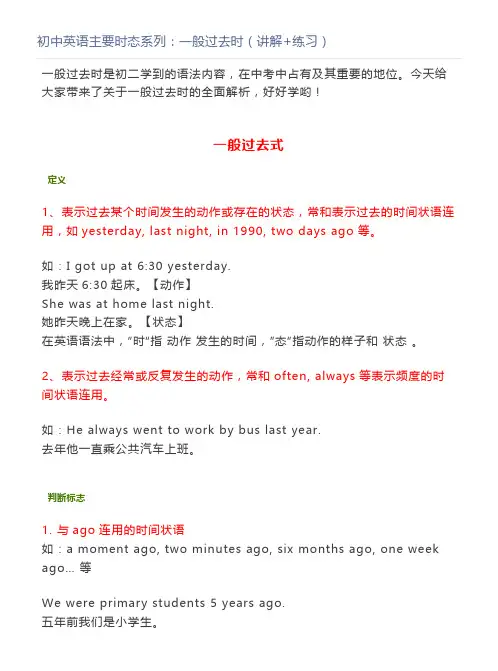
初中英语主要时态系列:一般过去时(讲解+练习)一般过去时是初二学到的语法内容,在中考中占有及其重要的地位。
今天给大家带来了关于一般过去时的全面解析,好好学哟!一般过去式定义1、表示过去某个时间发生的动作或存在的状态,常和表示过去的时间状语连用,如yesterday, last night, in 1990, two days ago等。
如:I got up at 6:30 yesterday.我昨天6:30起床。
【动作】She was at home last night.她昨天晚上在家。
【状态】在英语语法中,“时“指动作发生的时间,”态“指动作的样子和状态。
2、表示过去经常或反复发生的动作,常和often, always等表示频度的时间状语连用。
如:He always went to work by bus last year.去年他一直乘公共汽车上班。
判断标志1. 与ago连用的时间状语如:a moment ago, two minutes ago, six months ago, one week ago… 等We were primary students 5 years ago.五年前我们是小学生。
2. 与last 连用的时间状语last week, last year, last month, last day…He suddenly fell ill last night.他昨晚突然病倒了。
3. 与 yesterday 连用的时间状语yesterday morning, yesterday morning …We weren\'t late yesterday. 我们昨天没迟到.※the day befo re yesterday 昨天4. 与 one 连用的时间状语one morning 某个早上, one evening 某个夜晚5. 与that连用的时间状语that day, that morning, that year…6. 其他时间状语just now 刚刚 in the old days 在过去in 1980 at that time在那时构成含有be动词的一般过去时的主结构:主语+was/were+表语1、肯定句:主语+was/were+表语。
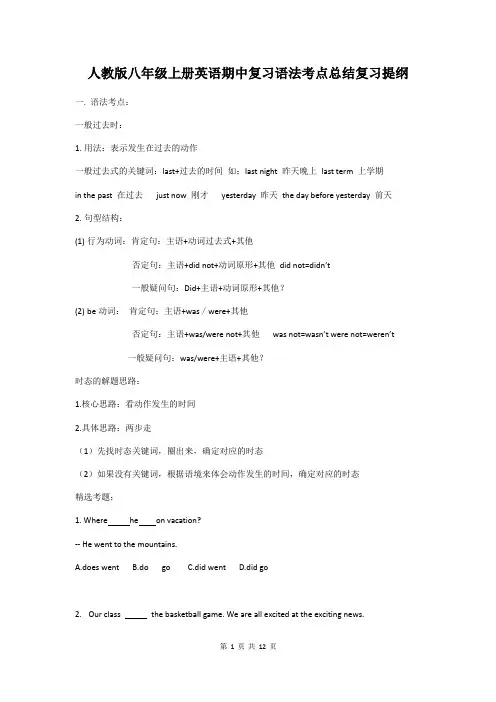
人教版八年级上册英语期中复习语法考点总结复习提纲一. 语法考点:一般过去时:1.用法:表示发生在过去的动作一般过去式的关键词:last+过去的时间如:last night 昨天晚上last term 上学期in the past 在过去just now 刚才yesterday 昨天the day before yesterday 前天2.句型结构:(1)行为动词:肯定句:主语+动词过去式+其他否定句:主语+did not+动词原形+其他did not=didn’t一般疑问句:Did+主语+动词原形+其他?(2)be动词:肯定句:主语+was/were+其他否定句:主语+was/were not+其他was not=wasn’t were not=weren’t一般疑问句:was/were+主语+其他?时态的解题思路:1.核心思路:看动作发生的时间2.具体思路:两步走(1)先找时态关键词,圈出来,确定对应的时态(2)如果没有关键词,根据语境来体会动作发生的时间,确定对应的时态精选考题:1. Where he on vacation?-- He went to the mountains.A.does wentB.do goC.did wentD.did go2.Our class the basketball game. We are all excited at the exciting news.A.will winB. winsC.wonD.is winning3. --Where you last night?-- I at home.A.are;amB.am;amC.were,wasD.were;were4. you visit your grandma last Friday?---No, I .A.Do;Study at homeB.Did; visited my grandmaC. Does; went swimmingD.Did; stayed at home5. Did you visit your grandma last Friday?---No, I .B.Study at home B.visited my grandmaC. Went swimmingD.stay at home6. He visited (visit) his grandparents last week.7. They took (take) quite a few photos (photo) when they visited Mount Tai.8. Kevin (go) (somewhere) interesting last month.9. Mrs Black (pick) some flowers in the garden yesterday.10. The old man (take) many photos and put them into his bag.put--put read--read cost--cost run---ran win--wontake--took buy---bought bring--brought play--played teach--taught1.Everyone had a good time there. (改为一般疑问句及否定句)have--过去式had。
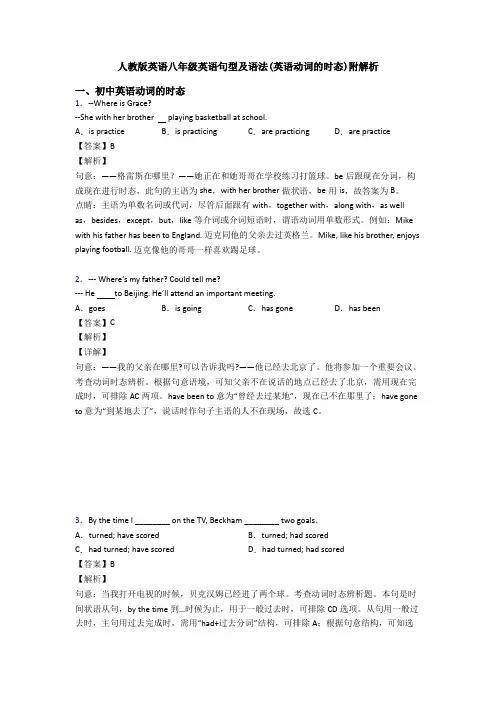
人教版英语八年级英语句型及语法(英语动词的时态)附解析一、初中英语动词的时态1.--Where is Grace?--She with her brother playing basketball at school.A.is practice B.is practicing C.are practicing D.are practice【答案】B【解析】句意:——格雷斯在哪里?——她正在和她哥哥在学校练习打篮球。
be后跟现在分词,构成现在进行时态,此句的主语为she,with her brother做状语,be用is,故答案为B。
点睛:主语为单数名词或代词,尽管后面跟有with,together with,along with,as well as,besides,except,but,like等介词或介词短语时,谓语动词用单数形式。
例如:Mike with his father has been to England. 迈克同他的父亲去过英格兰。
Mike, like his brother, enjoys playing football. 迈克像他的哥哥一样喜欢踢足球。
2.--- Where’s my father? Could tell me?--- He to Beijing. He’ll attend an important meeting.A.goes B.is going C.has gone D.has been【答案】C【解析】【详解】句意:——我的父亲在哪里?可以告诉我吗?——他已经去北京了。
他将参加一个重要会议。
考查动词时态辨析。
根据句意语境,可知父亲不在说话的地点已经去了北京,需用现在完成时,可排除AC两项。
have been to意为“曾经去过某地”,现在已不在那里了;have gone to意为“到某地去了”,说话时作句子主语的人不在现场,故选C。
3.By the time I ________ on the TV, Beckham ________ two goals.A.turned; have scored B.turned; had scoredC.had turned; have scored D.had turned; had scored【答案】B【解析】句意:当我打开电视的时候,贝克汉姆已经进了两个球。
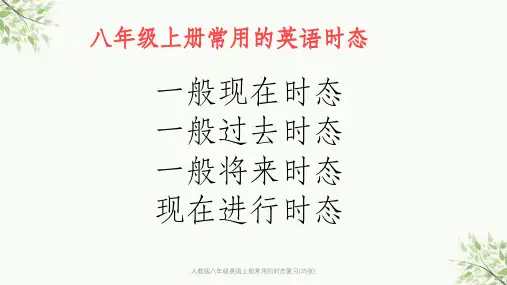
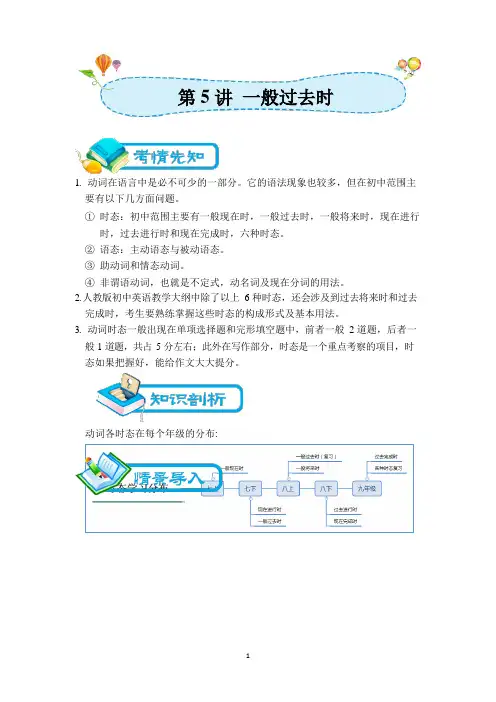
1. 动词在语言中是必不可少的一部分。
它的语法现象也较多,但在初中范围主要有以下几方面问题。
① 时态:初中范围主要有一般现在时,一般过去时,一般将来时,现在进行时,过去进行时和现在完成时,六种时态。
② 语态:主动语态与被动语态。
③ 助动词和情态动词。
④ 非谓语动词,也就是不定式,动名词及现在分词的用法。
2. 人教版初中英语教学大纲中除了以上 6 种时态,还会涉及到过去将来时和过去完成时,考生要熟练掌握这些时态的构成形式及基本用法。
3. 动词时态一般出现在单项选择题和完形填空题中,前者一般 2 道题,后者一般 1 道题,共占 5 分左右;此外在写作部分,时态是一个重点考察的项目,时态如果把握好,能给作文大大提分。
动词各时态在每个年级的分布:第 5 讲 一般过去时1.yesterday 或与其构成的短语:yesterday morning(afternoon, evening)等;2.由 last+时间名词构成的短语:last night, last year (winter, month, week)等;3.由―时间段+ago 构成的短语:a moment ago, a short time ago, an hour ago 等;4.其它 just now ,过去的时间:in 2000 等;一般过去时在七年级下册 Unit 11 中第一次出现,在这个单元的学习中,学生需要掌握以下知识点:一般过去时的定义及特征一般过去时的两种结构及其变化一般过去时的规则动词变形和不规则变形一般过去时的定义及特征定义:表示过去某个时间里发生的非持续性动作或存在的状态,也表示过去经常或反复发生的动作。
She opened the door this morning. (过去的非持续性动作) They were expensive twenty years ago. (过去存在的状态) I went swimming every Saturday last year. (过去经常发生的事)特征: a.谓语动词用过去式She was a doctor.I watered the flowers in the back yard. b.有表示过去的时间词She saw some paintings yesterday . Mary went fishing last weekend .注意:常与过去时搭配使用的标志性时间词1. 否定: 主语+was/were + not +其它 I was not (wasn’t) here yesterday.My parents were not (weren’t) at home last 2. 一般疑问句: Was/ Were +主语+其他?肯定回答用―Yes, 主语+was/were. 否定回答用―No, 主语+wasn’t/weren’t. ―Were you at home yesterday? ―Yes, I was. (No, I wasn’t.)—Were Wei Hua and Han Mei here just3. 特殊疑问句:特殊疑问词 + was/ were + 主语+其他?【即学即练】1. He usually gets up early in the morning. But he late today.2. She usually works from 8 a.m. to 5 p.m. But she from 8 a.m. to 6 p.m. yesterday.3. They often go to the park on Sundays. But they to the park last Monday.4. He reads the newspaper at breakfast. But he the newspaper yesterday morning.一般过去时的两种结构及其变化结构一:表示过去的状态: 主语+was/were +其它如:She was here yesterday.Three years ago I was a pupil. My parents were at home last night. 变化形式:否定:主语+did not +实义动词原形+其它 He didn’t watch TV yesterdayMike did not go to the farm last Sunday.一般疑问句: Did+ 主语+实义动词原形+其它? Did he watch TV yesterday?Did Mike go to the farm last Sunday?3.特殊疑问句:特殊疑问词 + did+ 主语 +实义动词原形+其它?What did he do yesterday?Where did Mike go last Sunday?结构二:表示过去发生的动作: 主语+实义动词过去式+其它注意:实义动词过去式分为规则和不规则变化(知识点三、四将会做详细讲解)如:He watched TV yesterday.Mike went to the farm last Sunday. Tom came to China last month. 变化形式:【即学即练】 1. My father ill yesterday. ( 2017 长沙七年级期末) A. isn’t B. aren’t C. wasn’tD. weren’t 2. your parents at home last week? ( 2017 江西七年级月考)A. isB. wasC. areD. were3. The twins in Dalian last year. They here now. ( 2016 大连七年级期末) A. are; wereB. were; areC. was; areD. were; was4. I my homework at 7:00 yesterday evening. ( 2017 兰州七年级期末)A. finishedB. would finishC. was finishingD. finish5. —?— He did some reading at home. ( 2017 安徽中考) A. What does your father do yesterday evening? B. What does your brother do in the school? C. What did your brother do over the weekend? D. Where did your brother go last Sunday?一般过去时的规则动词规则变形及不规则变形规则变形:情况加法原形例词一般情况加-ed look looked 以e 收尾的词加-d use used末尾只有一个辅音字母的重读闭音节词先双写这个辅音字母,再加-edstopplanstoppedplanned以“辅音字母+y”结尾的动词先变y 为i,再加-ed worrystudyworriedstudied不规则变形:1.中间去e 末尾加t,如:keep →kept,feel →felt,sleep →slept,sweep →swept2.结尾d 变t,如:build →built,lend →lent,send →sent,spend →spent3.遇见i 改为a,如:ring →rang,sit →sat,drink →drank,sing →sang,swim→ swam,4.“骑(马)”“开(车)”“写(字)”把i 变o 如:ride →rode,drive →drove,write →wrote 5.“想”“买”“带来”“打仗”ought 换上,如:think →thought,buy →bought,bring →brought,fight →fought6.“教书”“抓住”——aught 切莫忘,如:teach →taught,carry →caught7.ow/aw 改为ew 是新时尚,如:know →knew,grow →grew,throw →threw,draw →drew 8.“放”“让”“读”过去式与原形一个样,如:put → put,let → let,read → read /red/【即学即练】Dear Jim,My school trip 1. (is) great! We 2. (have) so much fun! We 3.(go) to Green Park. We 4. (climb) the mountains there and 5.(see) a lot of flowers. We 6. (eat) lunch under some trees and 7.(play) some games after that. But at about two o’clock, it 8. (get) very cloudy and we 9. _ (worry) it would rain. Luckily, it 10. (do not),and the sun 11. (come) out again!Bill易错点一:难以判别是否用过去式,如:I went to the supermarket and bought (buy) some fruit.由于没有找到时间状语,因而不知道应该填什么。
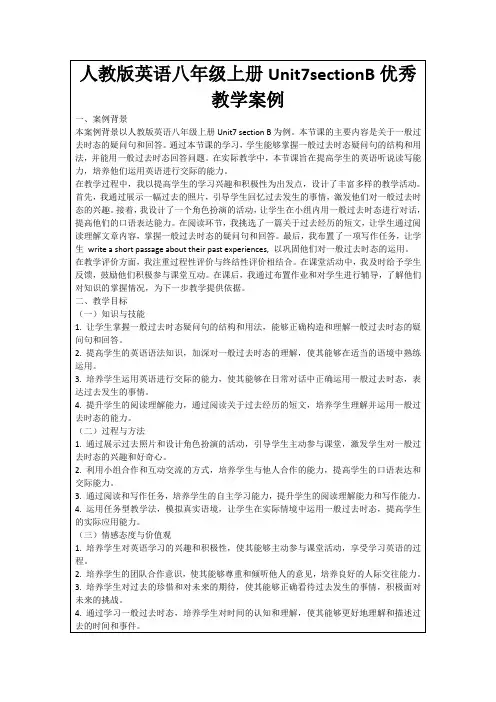
人教版英语英语一般过去时的用法大全及解析百度文库人教版英语英语一般过去时的用法大全及解析百度文库一、初中英语一般过去时1.―Jerry, have you ever been to the Great Wall?―Yes. I______ there with my parents last year.A. goB. wentC. will goD. have goneB句意:―Jerry,你曾经去过长城吗?―是的,去年我和我父母一起去那儿的。
由第二句的时间标志词last year 可以理解句意为去年我和爸妈去过长城。
属于一般过去时的标志词,故选B。
本题考查动词的时态。
根据句子的时间状语确定正确的时态。
2.He to play sports, but now he is interested in soccer and volleyball.A. doesn't useB. wasn't usedC. didn't useD. didn't usedC句意:他______做运动,但是现在他对足球和排球很感兴趣。
根据句意和选项可知此题考查一般过去时态的否定句式didn't+动词原形,故选C。
此题考查一般过去时态的否定句式,平时应多归纳总结各种时态,语态和句式的结构及用法。
3.After Steven sent some e-mails ,he______ surfing the Internet.A. startsB. has startedC. will startD. startedD句意:Steven发了一些电子邮件之后,他就开始上网冲浪。
start开始,是一个动词。
根据句意和上句话中Steven sent some e-mails可知,这里应该用一般过去时。
故选D。
A是一般现在时;B是现在完成时;C是一般将来时。
考查动词时态。
4.He_________ me his name, but I can't remember it now.A. tellsB. will tellC. toldD. is tellingC句意:他告诉我他的名字,但我现在记不起来了。
初中英语八大时态一一般现在时1构成: 构成: do/does---------V(原形)或V+s/es2 重点用法: a 客观真理。
Birds fly.b 现阶段习惯性动作。
We have four classes everyday.c 表将来1)按时间表进行的, 飞机、火车、巴士的出发The train for Guangzhou leaves at 7:00.2) 时间状语从句(till, until, when, as soon as等引导), 条件状语从句(unless, if引导)中表将来。
(主从) If it rains tomorrow, we will have to stay at home.3 标志词: 频率副词(often, everyday, on Sundays等)二一般过去时1 构成: 动词过去式did----------V-ed(不规则动词表的第二列)2 重点用法: 过去的事情He always went to work by bus last year.3 标志词: I worked here ten years ago.以及表示过去的时间( year, yesterday…) I got sick yesterday.三一般将来时1 构成will/shall do 或am/is/are going to do ----------will+ V原形2 重点用法: 将来的事情I will tell him about it.3 标志词: in+ 一段时间I will be back in an hour.以及表示将来的时间(week, tomorrow…)四过去将来时1 构成would do 或was/were going to do---------would+V(原形)2 重点用法从过去某一时刻看将来要发生的事情。
特别是宾语从句红, 主句said, wanted to know动词的过去式时, 宾语从句中, 表示过去的将来。
一、八年级上册涉及的时态1、一般过去时(Simple Past Tense)概念:过去某个时间或某段时间发生的动作或存在的状态;过去经常或反复发生的动作。
结构:谓语动词用过去式动词变过去式的规则:①一般情况,加-ed②以e结尾的动词,加-d③以重读闭音节结尾的动词,末尾只有一个辅音字母(辅元辅,除er),双写辅音字母,再加-ed④以辅音字母加y结尾的动词,变y为i,再加-ed⑤不规则动词表见八上P142时间状语:yesterday昨天,last night/week/year/month昨晚/上周/去年/上个月,in1990在1990年,two days ago两天前,3years ago三年前。
涉及单元:Unit12、一般现在时(Simple Present Tense)概念:经常、习惯性的动作或存在的状态。
结构:当主语为第一、二人称或三人称复数时,谓语动词用原形;当主语为第三人称单数时,谓语动词用第三人称单数形式。
动词变第三人称单数形式的规则:①一般情况,加-s②以s,x,ch,sh结尾的动词,加es③以辅音字母加y结尾的动词,变y为i,再加-es时间状语:every day/morning/weekend/每天/每早/每周,on the weekends/在周末,in the morning在上午,in the afternoon在下午,on Sundays在周日。
涉及单元:Unit2,3,4,53、一般将来时(Simple Future Tense)概念:将来某个时间要发生的动作或存在的状态;将来经常或反复发生的动作。
结构:be going to+v.原;will/shall+v.原There will be;there is/are going to be时间状语:tomorrow明天,next week/month/year下周/下个月/明年,in+一段时间in100years100年后,in25years25年后。
初二上册英语补习班名补教课设计目标提升班名师培优精讲专项语法讲练——一般过去时【教课内容】【观点引入】一般过去时是初中英语中特别重要的一个时态。
表示过去某个时间发生的动作或存在的状态,有时也表示过去常常或频频发生的动作。
比如:He left home at half past five yesterday.他昨天五点走开家的。
Li Ming always went to work by bike in the past.过去李明老是骑自行车去上班。
【语法解说】I、用法:1.表示在过去某个时间里发生的动作或存在的状态。
比如:Lin Tao left for Shanghai at 8:00 yesterday morning.林涛昨天清晨八点去上海了。
He was ill last night.昨晚他患病了。
2.表示过去常常或频频发生的动作。
比如:Li Tao always went to school by bus last term.上学期李涛向来乘公共汽车上学。
3.表示已故的人以前做过的事情。
比如:Lao She wrote many great works.老舍写过很多交口称赞的作品。
4.表示过去所发生的一系列的动作。
比如:The old man came into the room, took off his clothes and went to bed.这位老人走进屋,脱下衣服,而后上床睡觉了。
Mr. Black got up at six o'clock this morning, dressed, had breakfast, and went to work.布莱克先生今日清晨六点起床、穿衣服、吃饭,而后去上班了。
II 、一般过去时怎样辨别?每个时态,都会有其独到的标记性词语(主假如时间状语)。
能够称其为“标记词”。
往常来讲,一般过去常常有的标记词有:1.yesterday, the day before yesterday.st week / year / month / term ⋯(简称 last 系列 )3.two hours ago, three years ago, a moment ago⋯ (简称 ago 系列 )4. in / on +过去的年/月/日,如in 2019, in April, 20195. just now, once upon a time, one day ⋯ III 、分类:1.含有 be 动词的一般过去时:系动词 be 的过去式有两种形式:was 和 were。